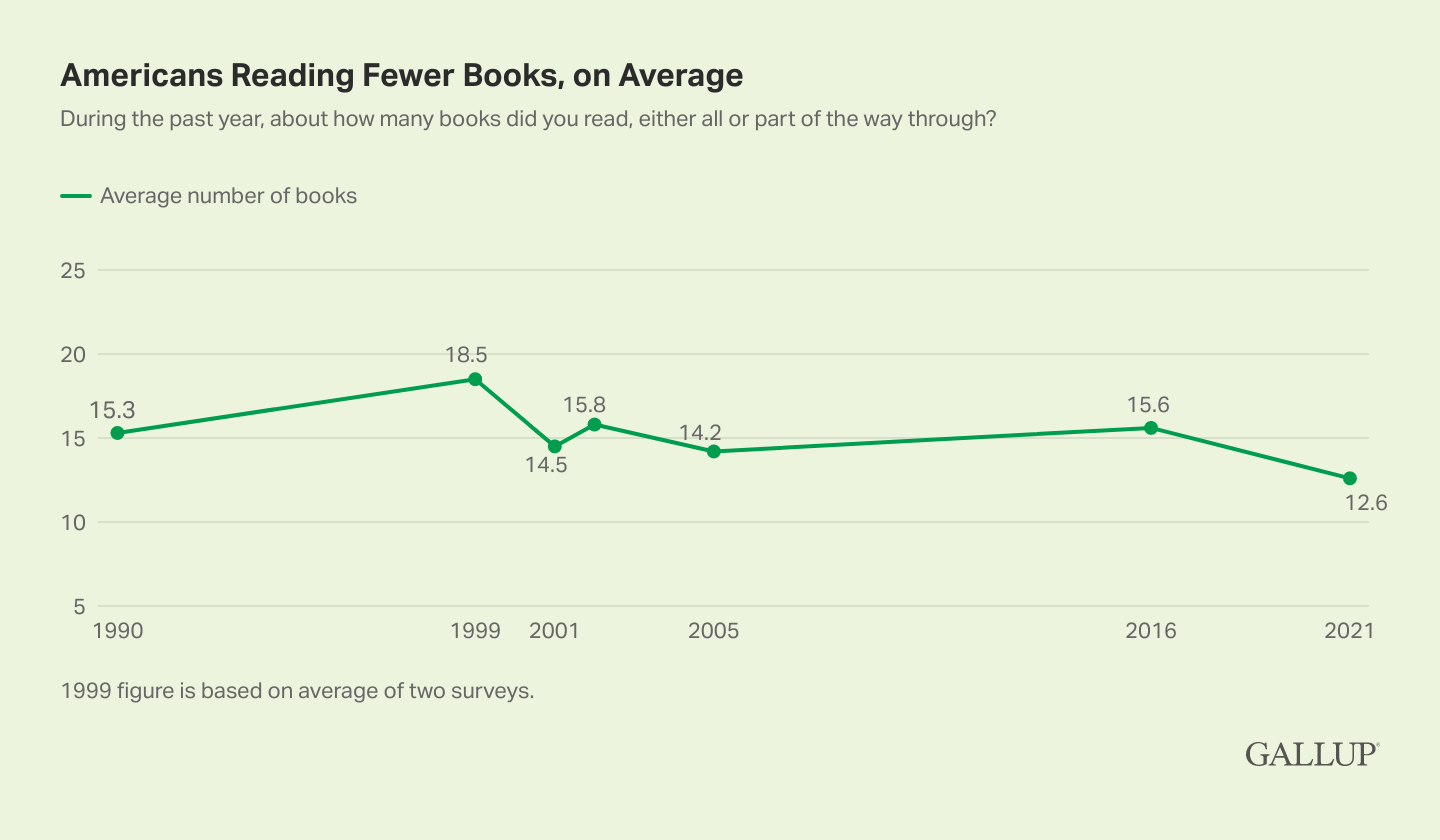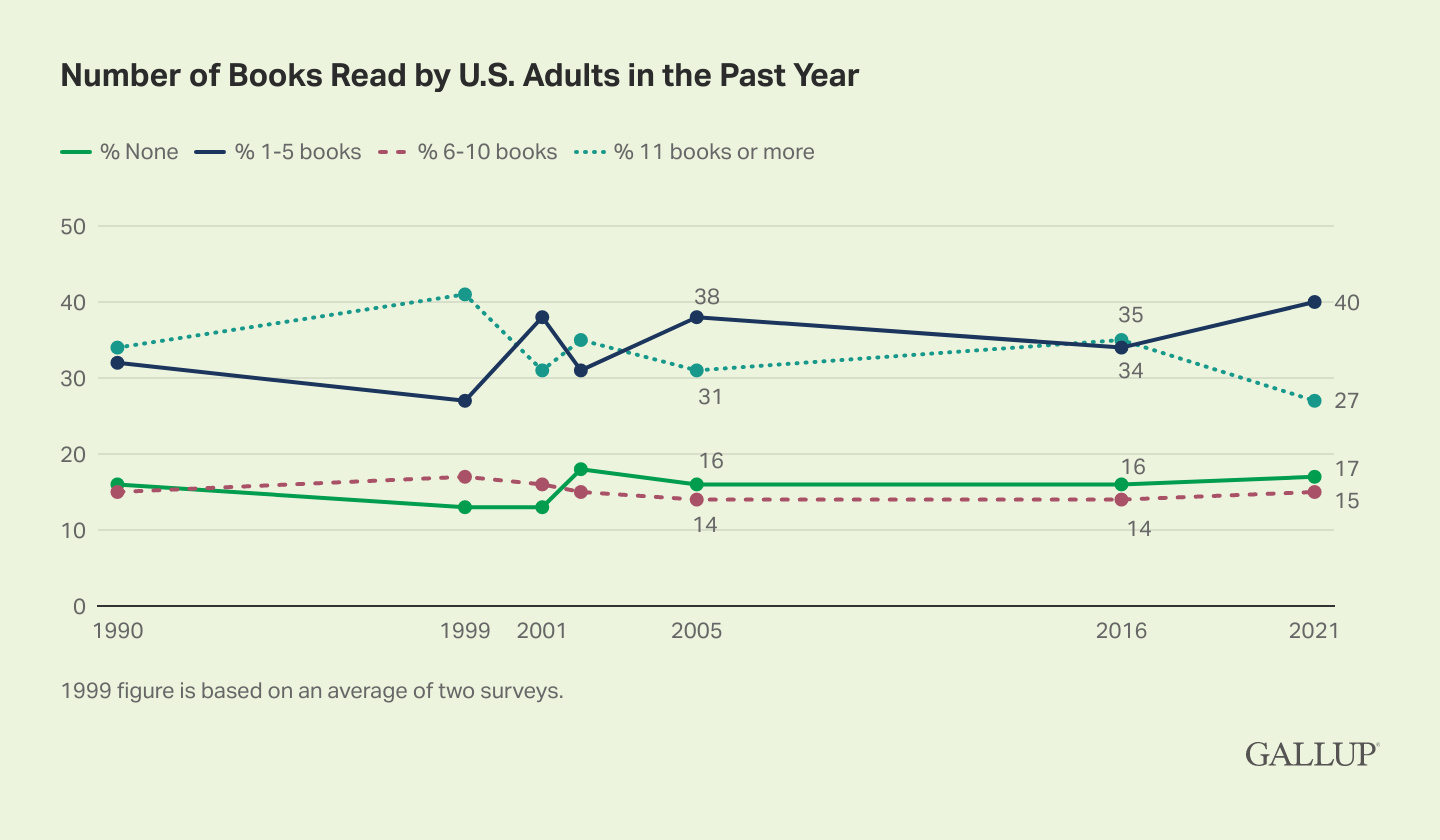How Many People Read Books They Buy?
Story Highlights
- Average number of books read down to 12.vi from 15.6 in 2016
- Percentage reading whatever books is stable; fewer are reading more than 10
- College graduates show largest decline in number of books read
WASHINGTON, D.C. -- Americans say they read an average of 12.vi books during the past year, a smaller number than Gallup has measured in any prior survey dating back to 1990. U.Southward. adults are reading roughly 2 or three fewer books per twelvemonth than they did between 2001 and 2016.

Line graph. Trend in boilerplate number of books Americans say they read in the by year. The 12.6 boilerplate for 2021 is down from 15.6 in 2016 and lower than whatever other year Gallup asked the question, including 14.2 in 2005, 15.viii in 2002, 14.5 in 2001, eighteen.5 in 1999 and 15.3 in 1990.
The results are based on a Dec. 1-16 Gallup poll, which updated a trend question on book reading. The question asks Americans to say how many books they "read, either all or part of the fashion through" in the past year. Interviewers are instructed to include all forms of books, including printed books simply likewise electronic books and audiobooks, when entering the respondent's respond.
The decline in book reading is more often than not a function of how many books readers are reading, as opposed to fewer Americans reading any books. The 17% of U.S. adults who say they did not read any books in the by year is like to the xvi% to eighteen% measured in 2002 to 2016 surveys, though it is higher than in the 1999 to 2001 polls.
The drop is fueled past a decline in the percentage of Americans reading more than 10 books in the by twelvemonth. Currently, 27% written report that they read more than 10 books, downwardly 8 pct points since 2016 and lower than every prior measure past at to the lowest degree four points.

Line graph. Trend in number of books Americans say they read in the past year. In 2021, 17% of U.S. adults said they read no books in the past twelvemonth, almost the same pct every bit in the prior reading in 2016 and similar to almost readings since 1990. At the same time, there was a decline in the number reading more than 10 books, from 35% in 2016 to 27% in 2021. That decrease was get-go by an increase in the percentage reading 1 to 5 books, from 34% to forty%. The percentage reading half-dozen to ten books was steady at xv%.
The reasons for the decline in book reading are unclear, with Americans maybe finding other ways to entertain themselves. Information technology is uncertain whether concerns well-nigh COVID or COVID-related restrictions are leading to a decline in visits to libraries or bookstores, similar to the documented declines in air travel and movie theatre attendance Gallup found in the aforementioned poll. However, different those activities, for reading, Americans tin order books or download electronic books or audiobooks without leaving their homes.
Higher Graduates Testify Steep Decline in Book Readership
Americans in most major subgroups are reading fewer books now than in the by. This is based on a comparing of the 2021 results to an average of those from the three polls conducted between 2002 and 2016. During those years, Americans read an boilerplate of 15.2 books a year.
The decline is greater amongst subgroups that tended to be more than gorging readers, particularly college graduates but too women and older Americans. College graduates read an average of well-nigh six fewer books in 2021 than they did between 2002 and 2016, 14.6 versus 21.1.
In the by, women read close to twice every bit many books as men did, but the gap has narrowed as the average U.S. woman read fifteen.7 books last year, compared with 19.3 between 2002 and 2016. Over the same period, men's readership declined by barely one book, to 9.5.
Older adults traditionally read a lot more than younger adults did, but that difference has vanished, with Americans aged 55 and older dropping from an average of 16.seven books read a year to 12, while in that location has been little change in the average number read by those younger than 55.
Alter in Average Number of Books Read, by Subgroup, 2002-2016 versus 2021
| 2002-2016 | 2021 | Change | |
|---|---|---|---|
| U.S. adults | 15.ii | 12.6 | -2.half dozen |
| Gender | |||
| Men | 10.eight | 9.5 | -1.3 |
| Women | 19.3 | 15.vii | -3.6 |
| Historic period | |||
| 18-34 years | 13.8 | 13.0 | -0.8 |
| 35-54 years | xiv.2 | 12.5 | -1.seven |
| 55+ years | sixteen.7 | 12.0 | -four.seven |
| College graduate | |||
| Yes | 21.1 | xiv.6 | -vi.5 |
| No | 12.half dozen | 11.5 | -1.1 |
| Gallup | |||
Once more, reduced book reading amongst these groups is more a role of fewer people reading larger numbers of books than fewer in the subgroup reading at all. Between 2002 and 2016, close to half of higher graduates (48%) read more than 10 books in a yr. Last year, 35% of college graduates read more than x books.
Similarly, the percent of older adults reading more than 10 books roughshod from 34% to 24%, while the percent of women reading that many books dropped from 41% to 32%.
Bottom Line
Reading appears to be in decline as a favorite way for Americans to spend their complimentary time. In 2020, a few months into the COVID-19 pandemic, when many Americans were still reluctant to get out their homes, Gallup found 6% of U.S. adults naming reading as their favorite way to spend an evening, down from 12% in 2016. Since Gallup first asked the question in 1960, at least 10% of Americans had identified reading as their favorite evening activeness in all but i survey.
The new data on volume reading reinforce that the popularity of reading is waning, with Americans reading an average of three fewer books concluding twelvemonth than they did five years ago and had typically read for the by 3 decades. The decline is non because fewer Americans are reading at all -- a pct that has held steady at 17% -- but because Americans who do read are reading fewer books. The changes are especially pronounced among the most voracious book readers, namely, higher graduates, women and older Americans.
Information technology is unclear from these information if the declines in book readership are occurring because of a lack of interest in books, a lack of time to read books, or perhaps COVID-xix-related disruptions in lifestyle activities or access to books. It is likewise uncertain at this bespeak whether the declines in volume reading marking a temporary change or a more permanent i.
To stay up to date with the latest Gallup News insights and updates, follow us on Twitter .
Learn more about how the Gallup Poll Social Series works.
View consummate question responses and trends (PDF download).
Source: https://news.gallup.com/poll/388541/americans-reading-fewer-books-past.aspx
0 Response to "How Many People Read Books They Buy?"
Post a Comment